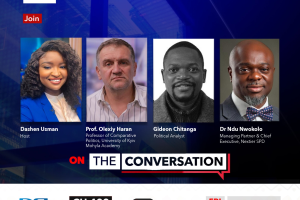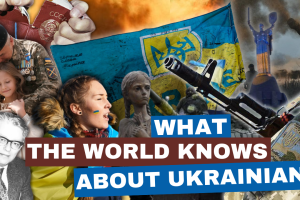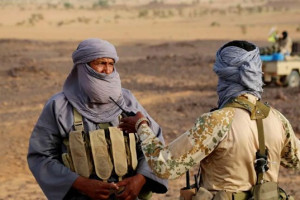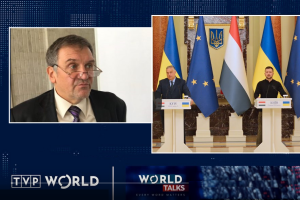In 2019, the trend of the whole year was set overnight into its first day when popular comedian Volodymyr Zelenskyy announced his presidential bid during his appearance on one of major Ukrainian TV channels. His greetings and the announcement were aired minutes before midnight instead of the traditionally televised end-of-year address of the incumbent President, Petro Poroshenko at that time. About four months later Zelenskyy took presidential office, and some three more months later his party, Servant of the People, took the majority of seats in the parliament. Most Ukrainians believed that Zelenskyy was an honest person of the new generation, the political outsider who could undermine the oligarchic system and immediately improve living standards for everyone. The public trust in Zelenskyy was so huge that even now, in early 2020, his balance of trust remains positive despite multiple questionable appointments and decisions he made in nine months of his presidency.
At the end of 2019, Ukrainian major pollsters conducted several surveys to discover the public perception of the year 2019. The Ilko Kucheriv Democratic Initiatives Foundation (DI) in collaboration with the Razumkov Centre polled 2017 respondents in all Ukrainian regions except for the occupied areas with the theoretical sampling error not exceeding 2.3%. The sociological group Rating polled 2,500 more Ukrainians (sampling error of up to 2%). Additionally, DI questioned 58 experts on the issue.
A few more polls were held in January-February 2020 to discover current public opinion.
Most important events in 2019
The DI/Razumkov survey and DI expert poll found that 58% of Ukrainians and 50 out of 58 experts considered the presidential and parliamentary elections as the most significant event of the year. The nationwide poll placed the release of Ukrainian political prisoners from Russia second with only 8%, and the long-awaited Normandy Four talks on Donbas issues third (5%). The autocephaly for Ukrainian church, disengagement of forces in the Donbas, and launching the land market shared the fourth position with some 2%. Meanwhile, the experts believed that the second top event of 2019 was launching various reforms under the previous government and continuing them by the newcomers, and they polled experts placed third “some indications that anti-corruption efforts would intensify and increase.”
In the Rating Group’s poll respondents could name three options, and its results are different from DI/Razumkov’s. In particular, the most important event was the return of Russia-held Ukrainians (48%) followed by the presidential elections (44%). The third was the relaunching of the negotiations on the Donbas in the Normandy Four format (21%) and the parliamentary elections, combined with the presidential ones in DI/Razumkov’s survey to overshadow other options, found themselves only at the fourth position (15%) in the Rating’s poll. Among other answers that gained more than 10% were the Ukrainian national soccer team getting to the finals of Euro 2020, and strengthening of the national currency, the hryvnia.
Politician of the year, trust ratings
The DI poll shows that Volodymyr Zelenskyy was the politician of the year with about 46% of respondents placing him first.
The most recent survey held in the first week of February 2020 by the center Social Monitoring and the Ukrainian Institute of Social Studies showed that Zelenskyy keeps his approval rating at around 50% which is still huge, though it has dropped as compared to his 68% approval surveyed by the Razumkov Center in November 2019.
According to DI, among the politicians, only Zelenskyy and head of the Parliament Dmytro Razumkov from Zelenskyy’s Servant of the People party had a positive level of trust in late 2019: the former’s rating was +31% (62% trust, 31% distrust), the latter had +10% (+48%/-38%). One more trusted figure was the former political prisoner, film-maker Oleg Sentsov with +5% of the trust.
The most distrusted politicians were as follows:
- Petro Poroshenko, former president (-66%),
- Viktor Medvedchuk, pro-Russian MP (-61%),
- Vitaliy Klitschko, Kyiv mayor (-55%),
- Arsen Avakov, Minister of Internal Affairs (-54%),
- Yuliya Tymoshenko, MP (-54%),
- Yuriy Boiko, pro-Russian MP (-47%),
- Anatoliy Shariy, pro-Russian blogger living abroad whose party was running for parliament but lost (-41%).
43% of respondents believe that the current government is better than their predecessors, 13% are of the opposite opinion, while 34% didn’t see any difference between the two.
Among the institutions, the Armed Forces, the church, and volunteer organizations were those who topped the trust rating, while Russian media, the judicial system, and political parties were distrusted the most.
Country’s overall direction and living standards
According to the DI survey, 44% of the poll participants suggested that Ukraine was moving in the right direction, with 36% thinking that the direction was wrong, and 20% having no opinion on the matter. A year before, at the end of 2018, the absolute majority (70%) believed that the country’s movement was wrong, and only 18% thought it was right. According to DI, last time the polls that showed the majority of Ukrainians positively evaluating the direction of the country was after the 2005 presidential elections when pro-Western Viktor Yushchenko came to power. As of June 2005, 42% perceived the country’s direction as right with 31% as wrong. However, already in November of the same year, 59% believed it became wrong, and 18% still saw it being right.
While believing that Ukraine had been moving in the right direction, the majority of respondents reported the worsening of the situation in most areas of life in 2019, though not that much as in 2018 – 29% saw it worsened in 2019 against 67% in 2018. The DI poll shows that the most negative changes in 2019 were believed to be with prices and tariffs (61%), healthcare (46%), and with social protection (44%). Meanwhile, Ukrainians saw improvements in the nation’s defense capability (31% saw positive changes, 15% negative, and 44% didn’t notice any changes), international image of Ukraine (31% saw it improved, 21% worsened, 38% unchanged), and in inter-ethnic relations (19% believed in positive changes, 15% in negative, 54% saw no change). The answer “there were no changes” prevailed in all other areas.
On a scale of 1 to 10, Ukrainians rated the economic situation in 2019 at 2.46, and the welfare of their families at 2.75.
Ukrainians optimistic about the country’s future, see it in EU and NATO
28% believed in Ukraine’s ability to overcome difficulties in the next few years, while 50% also thought that it was going to happen but later on. Only 11% saw Ukraine unable to get over the difficulties in principle.
51% hoped that 2020 was going to bring more good than bad. 20% of respondents were sure that 2020 would be a better year than 2019, 16% expected it to be worse. However, the respondents strongly believed only in the stability of the national currency (52% did while 36% did not), and in increasing investments in Ukraine (47% with 33% of non-believers).
In recent years, the attitudes of Ukrainians towards foreign policies have been relatively stable. In December 2019, 64% chose the EU membership over entering Russia’s Customs Union (13%).
And most Ukrainians believe that the best way to ensure security for Ukraine would be membership in NATO (51%). However, entering NATO is a more preferable option only in Ukraine’s western (80%) and central (54%) regions, while neutrality was the most often choice in the south (41%) and east (42%). Moreover, 14% of easterners saw a military alliance with Russia as the best option for Ukraine’s security, though in 2018 such an opinion was supported by 20% in the east.
A survey conducted by SOCIS in late January 2020 showed similar results with about 59% of Ukrainians were ready to vote for EU membership and more than 46% of those favoring accession to NATO, in case the corresponding referendums would have been held in the near future. About 24% would not favor joining the EU and 31% NATO.
The absolute majority of respondents in the DI survey identified themselves as nationals of Ukraine (75%, against 2018’s 67.5%). The regional identification prevailed for 16% of responders. The nationwide identification dominated in all Ukrainian regions.
Thinking about the future of Ukraine, the respondents mostly felt hope (56%), optimism (38%), and anxiety (26%). Compared to 2018, the level of optimism increased by 10%.
61% of respondents felt that they were mostly happy in general in 2019 (60% in 2018).
Source: Euromaidanpress










